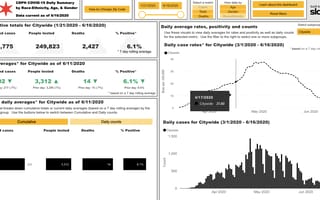
The city unveiled a snappy new COVID-19 data dashboard this week. Carrie Steyer, general manager of Slalom’s Chicago market, said she hopes its information will make an impact.
Built just for Chicagoans by the Seattle-headquartered consulting company, the “COVID-19 Weekly Summary” allows individuals across the city to search how the pandemic has affected their neighborhood and ethnic group, find local testing sites and more.
Slalom, which has 825 employees in Chicago, worked on the pro bono project in partnership with the Chicago Department of Public Health, the city’s Racial Equity Response Team and the Civic Consulting Alliance. The group wanted to ensure all Chicagoans — particularly the city’s Black and brown communities who have been disproportionately hit by the outbreak — have access to the information they need.
“Being able to get information out into people’s hands is powerful,” Steyer told Built In. “It gives people the ability to make decisions for themselves, but also the city the ability to make decisions to hopefully get us back to our new normal as quickly as possible.”
Steyer said Slalom’s work with the city started in March, when Chicago officials issued a stay-at-home order for residents. The company asked city leaders how it could support their pandemic response and, two months later, it launched a tool the city’s Racial Equity Rapid Response team could use to learn where small business loans were distributed. Officials used the tool to identify underinvested areas, and donate microgrants to local and minority-owned businesses, Steyer said.
From there, Slalom’s work with the city was not done. Chicago officials then asked Slalom to build a searchable dashboard residents could use to see the impact of the coronavirus in each of the city’s 77 neighborhoods.
It was difficult work. The team was concerned with making the mass of information collected from hospitals, community groups and other public-health organizations easy to understand. Slalom also worked to build the platform as quickly as possible, Steyer said.
The company estimates it has invested more than 7,000 hours supporting city and state agencies since the pandemic began.
“They were working long hours and long days,” Steyer said. “Time is definitely of the essence with the response to COVID.”
The final product was built on a Microsoft Power BI dashboard.
Steyer said she hopes the final tool informs residents’ understanding of where Chicago’s outbreak has been most prevalent, and where they can get testing. She said she also hopes it informs public officials’ policy decisions, and drives collaboration between public officials, private doctors, state agencies and other entities going forward.
“Solving any kind of challenge that the community has involves a whole bunch of things,” Steyer said. “People, yes. Process, yes. But definitely technology is part of the solution. And so us being able to give back with the skills that we have, it’s important.”
The Seattle company has been growing its Chicago headcount in recent years as part of its growth strategy. As of February, it was aiming for 200 percent revenue growth by 2025. The company currently has over 8,000 employees worldwide.




